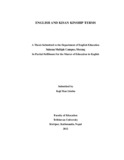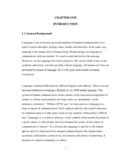Please use this identifier to cite or link to this item:
https://elibrary.tucl.edu.np/handle/123456789/3539| Title: | English and Kisan Kinship Terms |
| Authors: | Limbu, Kaji Man |
| Keywords: | Multilingualism;Linguistic Situation;Kinship Terms;Language Shift |
| Issue Date: | 2012 |
| Publisher: | Faculty of English Education |
| Level: | Masters |
| Abstract: | The research entitled “English and Kisan Kinship Terms” presents a clear picture of a comparative study between English and Kisan kinship terms. The main objective of this study was to find out the Kisan kinship terms and to compare and contrast them with those of English. The present study was carried out on Kinship terms of English and Kisan languages presented through both consanguineal and affinal relations from both sides Viz. male and female ego in English and Kisan. The kinship relationships of English and Kisan were also studied by both addressive and appellative uses from the prospective of both male and female ego. The data of Kisan kinship terms were collected from forty native speakers of the Kisan language who were randomly selected from two wards of Mechi Nagar Municipality. Respondents were divided into different strata, using the stratified random sampling procedure. Set of questionnaires and mobile phone recorder were used as research tools to collect data. It was found that there are more kinship terms in the Kisan language than that of English. Sixty nine kinship terms were found in the study. Among them, twenty seven are consanguineal and forty two are affinal relations. It was also found that English language has some cover terms such as ‛grand parents’, ‛sibling’, ‛parents’, ‛cousin’, ‛offspring’ and ‛grandchild’ but they lack in the Kisan language. This thesis has four chapters: The first chapter contains general background, literature review, objectives of the study, significance of the study and definitions of relations. The second chapter consists of source of data, sampling population, sampling procedure, tools for data collection, process of data collection and the limitations of the study. The third chapter consists of analysis and interpretation of the data obtained. Lastly, the fourth chapter comprises findings and recommendations. |
| URI: | http://elibrary.tucl.edu.np/handle/123456789/3539 |
| Appears in Collections: | English Language Education |
Files in This Item:
| File | Description | Size | Format | |
|---|---|---|---|---|
| cover.pdf | 46.24 kB | Adobe PDF |  View/Open | |
| CHAPTER.pdf | 423.2 kB | Adobe PDF |  View/Open |
Items in DSpace are protected by copyright, with all rights reserved, unless otherwise indicated.
